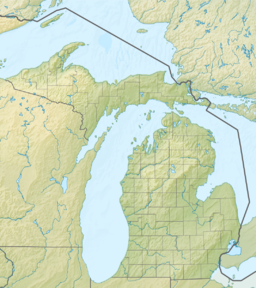Siskiwit Lake[1] is the largest lake on Isle Royale in Lake Superior. 4,150 acres (16.8 km2) in area,[2] the lake has cold, clear water which is relatively low in nutrients.[3] Tributaries include the Little Siskiwit River, and the lake's outlet is the Siskiwit River which flows into Lake Superior.
| Siskiwit Lake | |
|---|---|
 Isle Royale. Siskiwit Lake is the dark patch in the center | |
| Location | Isle Royale |
| Coordinates | 48°00′05″N 088°47′50″W / 48.00139°N 88.79722°W |
| Primary outflows | Siskiwit River |
| Basin countries | United States |
| Surface area | 4,150 acres (16.8 km2) |
| Surface elevation | 646 ft (197 m) |
| Islands | Ryan |
Siskiwit Lake is available for fishing, with restrictions (no motorized boats, no natural bait). Lake Trout, Brook Trout, Rainbow Trout, and Yellow Perch are found in the lake.[4] A 2004 study of toxaphene concentrations found that concentrations were lower in Siskiwit Lake trout than in Lake Superior trout, possibly due to shorter food chains and greater reliance on zooplankton or other pelagic invertebrates.[5]
Siskiwit Lake contains several lake islands, including Eagle Nest Island, Teakettle Island, Lost and Found Island,[2] and Ryan Island. Common loons nest and breed on some of these islands.[2]
Siskiwit Lake and Ryan Island were together part of the subject of the Moose Boulder hoax, which claimed that a boulder existed in the seasonal pond of Moose Flats on Ryan Island in Siskiwit Lake. This would have made Moose Boulder the largest known island in a lake on an island in a lake on an island in a lake. In 2020, Moose Boulder was reported to be a hoax.[6][7]
See also
editReferences
edit- ^ U.S. Geological Survey Geographic Names Information System: Siskiwit Lake (Isle Royale)
- ^ a b c Kaplan, Joseph D.; Tischler, Keren B. & McCormick, Damon L. (May 1, 2002). "A Breeding Atlas of the Common Loon (Gavia Imer) at Isle Royale National Park, Michigan" (PDF). BioDiversity Research Institute. Retrieved February 21, 2014.
- ^ Shelton, Napier. "THE LIFE OF ISLE ROYALE". npshistory.com. Retrieved 23 June 2023.
- ^ "Fishing". Nyx. Retrieved February 21, 2014.[better source needed]
- ^ Muir, Derek C. G.; Whittle, D. Michael; De Vault, David S.; Bronte, Charles R.; Karlsson, Heidi; Backus, Sean & Teixeira, Camilla (April 2004). "Bioaccumulation of Toxaphene Congeners in the Lake Superior Food Web". Journal of Great Lakes Research. 30 (2): 316–340. doi:10.1016/S0380-1330(04)70350-0.
- ^ Taub, Matthew (March 10, 2020). "The Intrepid Mother and Son Who Unraveled a Geographic Hoax". Atlas Obscura.
- ^ "The Lonely Non-Island: Unfortunately, Moose Boulder Doesn't Exist". NPR. March 13, 2020.
